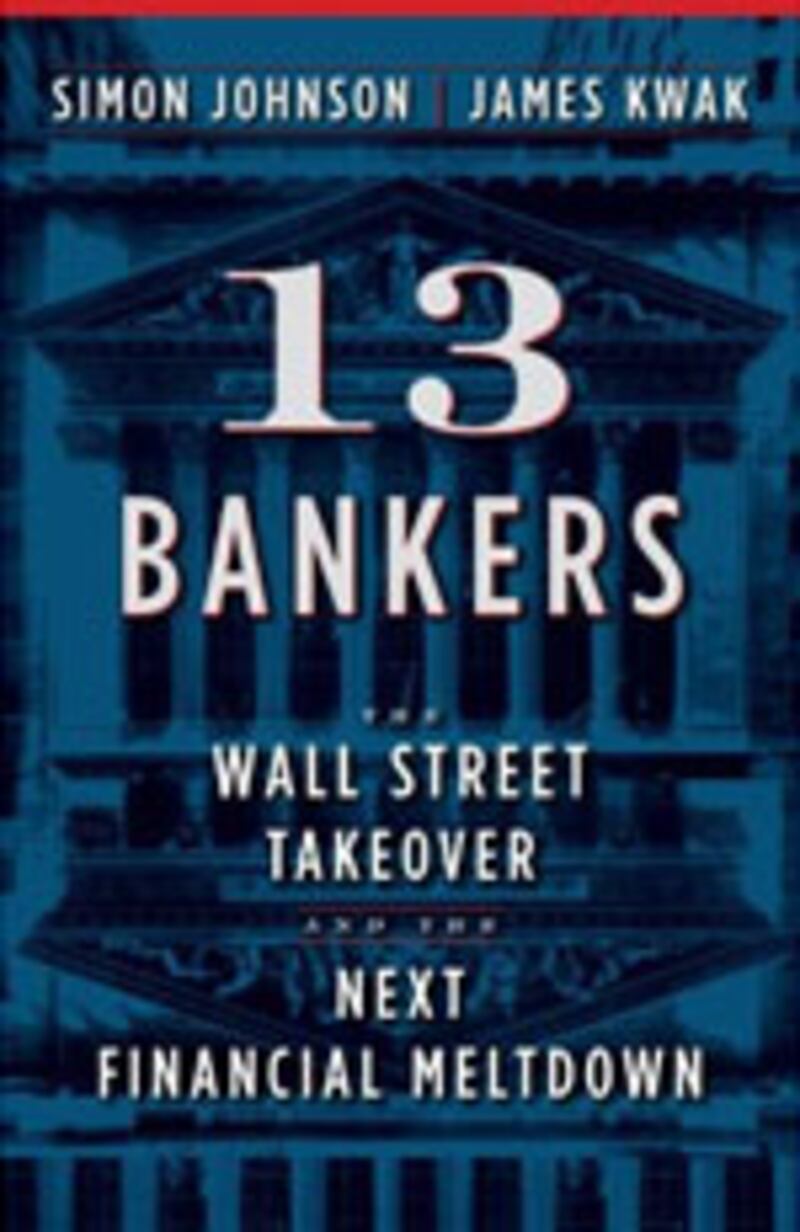
A week or so from now, after the congressional recess, efforts to enact financial reform will go into high gear. The House of Representatives has passed a bill, the Senate is about to debate one, and President Obama is determined to sign a new law by early summer. In 13 Bankers: The Wall Street Takeover and the Next Financial Meltdown, Simon Johnson and James Kwak predict, correctly in my view, that the ultimate legislation will be fairly modest in its impact. There will be nothing to compare, for example, to the 1930s’ passage of the Glass-Steagall Act that separated staid commercial banking from risky investment banking, or the establishment of federal deposit insurance to prevent runs on a bank, or the creation of the Securities & Exchange Commission to protect investors. The authors ask what accounts for the lack of radical change given the severity of the recent banking crisis and the deep, painful recession. The bulk of this riveting book answers that question not with reference to short-term politics but instead with an extraordinarily rich sweep of history.
The only answer, say the authors, is to bust what they call the American financial oligarchy, which they compare to the power wielded by a handful of oligarchs in Russia or South Korea.
But 13 Bankers is not a dramatic story of the credit implosion or the government response, as is Andrew Ross Sorkin’s pot boiler Too Big to Fail. It doesn’t cover the waterfront of policy issues such as Robert Pozen’s Too Big to Save, and it isn’t a substitute for personal accounts, such as Henry Paulson’s On the Brink. What it does do, uniquely, is provide a clear and compelling account of the evolution of the relationship between Wall Street and Washington from the days when Thomas Jefferson and Alexander Hamilton argued over how fragmented or centralized America’s banking system should be. It provides the essential context for understanding how the financial and the political worlds in America came to interact as they do, and how Wall Street and all it has stood for—free markets, constant innovation, the glamour of personal wealth—came to dominate American politics so heavily in the past 30 years.

Starting with the Reagan revolution, the book describes Wall Street’s growing clout in financing political campaigns and the additional policy influence it has accrued from the movement of its leaders—such as ex-Goldman Sachs CEOs Robert Rubin and Henry Paulson—to the most influential Washington positions. Johnson, a professor at MIT, and Kwak, a consultant and entrepreneur, show how waves of deregulation since the 1980s have allowed banks to expand from being able to operate in just one state to establishing branches throughout the country; how barriers dissolved between conservative deposit-taking institutions and those who were able to take big investment risks; and how trading in derivatives escaped regulation. While Wall Street was able to earn outsized profits in good times, say the authors, they didn’t hesitate to come running to taxpayers for a bailout when they got into trouble. Moreover, their political influence insured that the government rescue was enacted with hardly any constraints on their future behavior.
In addition to a fascinating historical tour, 13 Bankers describes the high degree of concentration that has resulted from bank mergers over the years and how it was greatly enhanced since 2008, giving the big financial firms even more political clout than they had. JPMorgan Chase is emblematic. Before the crisis, it was a roll up of what had been Chemical Bank, Manufacturers Hanover, Bank One, First Chicago, Chase Manhattan, and JP Morgan. During the crisis, it acquired Bear Stearns and Washington Mutual. In 2008, Bank of America, also comprised of many former companies, acquired Merrill Lynch, and Wells Fargo gobbled up Wachovia. There are far fewer megabanks today, but they now control a far greater proportion of the nation’s assets, including mortgages and derivatives, than they did in 2007, and their global reach and connections are even greater than before. As a result, the most explosive problem with big banking has now been magnified: They are free to take exceptional risks because they are sure that taxpayers cannot and will not let them fail. Given that, there is no reason to think another major crisis will not take place.
The only answer, say the authors, is to bust up what they call the American financial oligarchy, which they compare to the power wielded by a handful of oligarchs in Russia or South Korea. They call for dismantling the big banks—reduce their size, and separate deposit-taking from more risky investments—and thereby defuse their political capability to hold the country hostage. Johnson and Kwak understand that such actions will require a new political zeitgeist in America, but they are hopeful that the public mood could shift over the next several years, just as it changed from the laissez-faire attitudes of the late 19th century to the early 20th century, when Theodore Roosevelt and Woodrow Wilson finally busted up big industrial trusts such as US Steel and Standard Oil.
I wish I shared their optimism that there is a political scenario in which big banks could fail and not bring down the global financial system with them, but the American public could be light years away from agreeing to the massive government intrusion that would be necessary to implement this book’s revolutionary proposal. Even the Supreme Court has recently made it easier for big companies to influence elections. Besides that, the authors too cavalierly wave off critical competitive issues of America’s needing big banks at a time when European and Asian financial institutions are bulking up. And although the authors try to come to grips with the question of how big is too big, they, like everyone else, don’t really have a good answer.
When Congress and the administration fight it out, 13 Bankers will be a must-read. And come the next crash, it will be so again.
Plus: Check out Book Beast, for more news on hot titles and authors and excerpts from the latest books.
Jeffrey E. Garten is the Juan Trippe professor of international trade and finance at the Yale School of Management, and served in economic and foreign-policy positions in the Nixon, Ford, Carter, and Clinton administrations.





